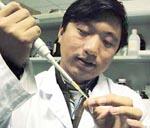Chinese Scientists Successfully Clone Dentinogenesis GeneThe scientists, a collection of 15 researchers from the Shanghai Institute for Biological Sciences, local universities and hospitals and the Chinese National Human Genome Center in Shanghai, spent two years on their achievement - which they claim is a world first. "The significance lies in two fields: It raises the possibility for discovering a therapy for this disease, and it shows China is on the cutting edge of gene-cloning," said Kong Xiangyin, one of the lead researchers. "As a result, China has entered a new era of gene study." Working under a 30-million-yuan (US$3.6 million) grant from the Chinese Academy of Sciences, the researchers found and decoded a gene they say controls a disease known as dentinogenesis imperfecta 1, which causes brittle teeth. Some patients suffer not only tooth cracking but hearing loss as they age. So far, there is no effective treatment. "The achievement has established a good beginning for our research on gene-related diseases, but it still may take us more than 10 years to produce medicines to cure this affliction," Kong said. In carrying out their research strategy, the scientists conducted a close examination of the genes of patients suffering from the dental disease. They first attempted to discover similarities, or marker genes that pointed to the cause of the disorder. After finding the marker, the scientists then cloned it to produce a supply of genetic material for further study. By figuring out how the gene works, researchers hope to develop a medicine to fight the disease. The thesis written by the 15 Shanghai scientists, who were supported by 10 others from outlying provinces, was presented in the February edition of Nature - an authoritative biology magazine. Scientists point out there are about 100,000 genes in each human cell which contain the secrets of life. Early last year, researchers from around the world worked out the first draft of the human genome sequence. The job now is to figure out the function of each gene. "Though China lags behind the leading countries such as the United States and Britain in sequencing genes, it enjoys a high potential for the latter task," said Chen Zhu, vice president of Chinese Academy of Sciences. |
| People's Daily Online --- http://english.peopledaily.com.cn/ |
